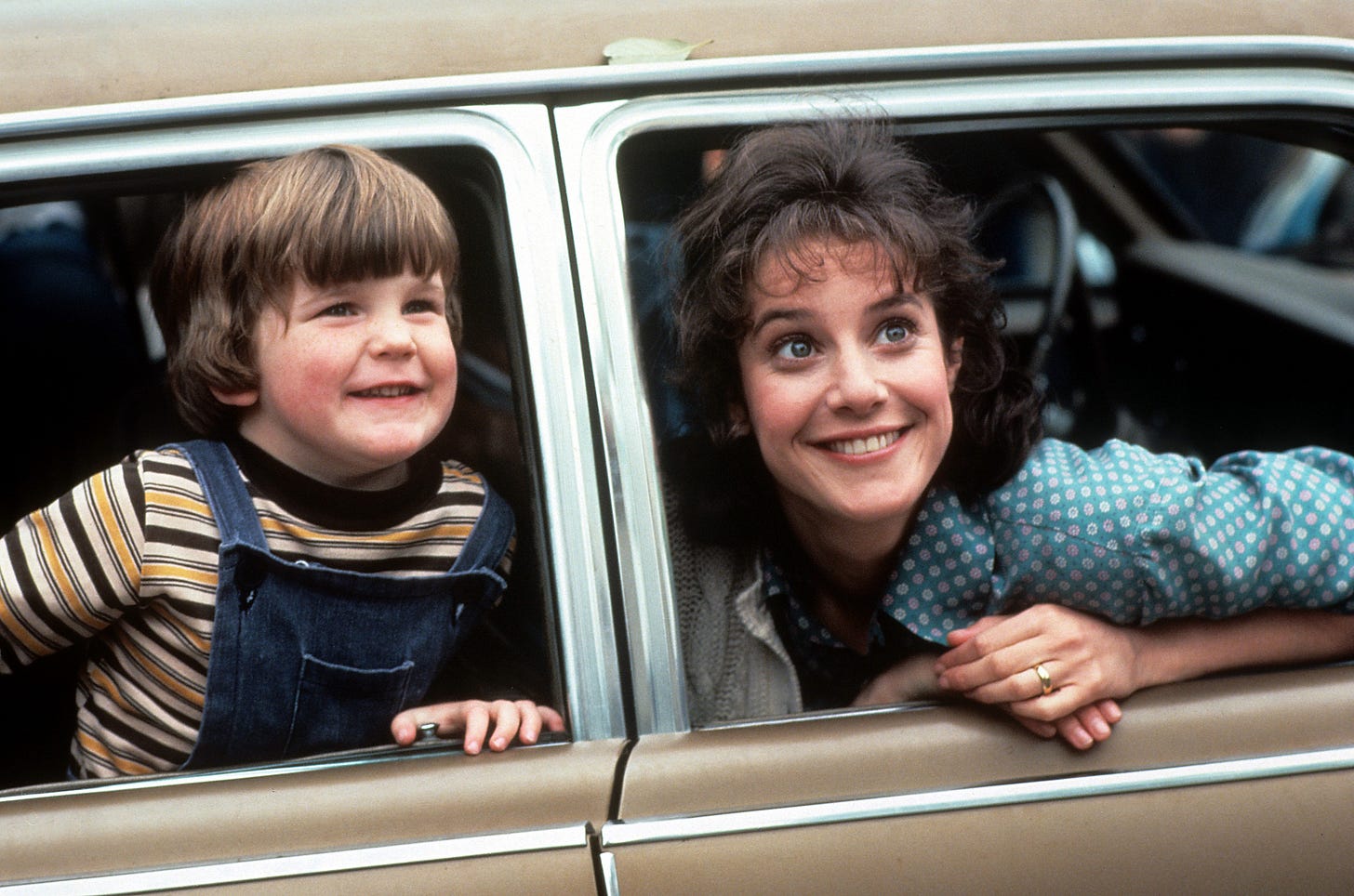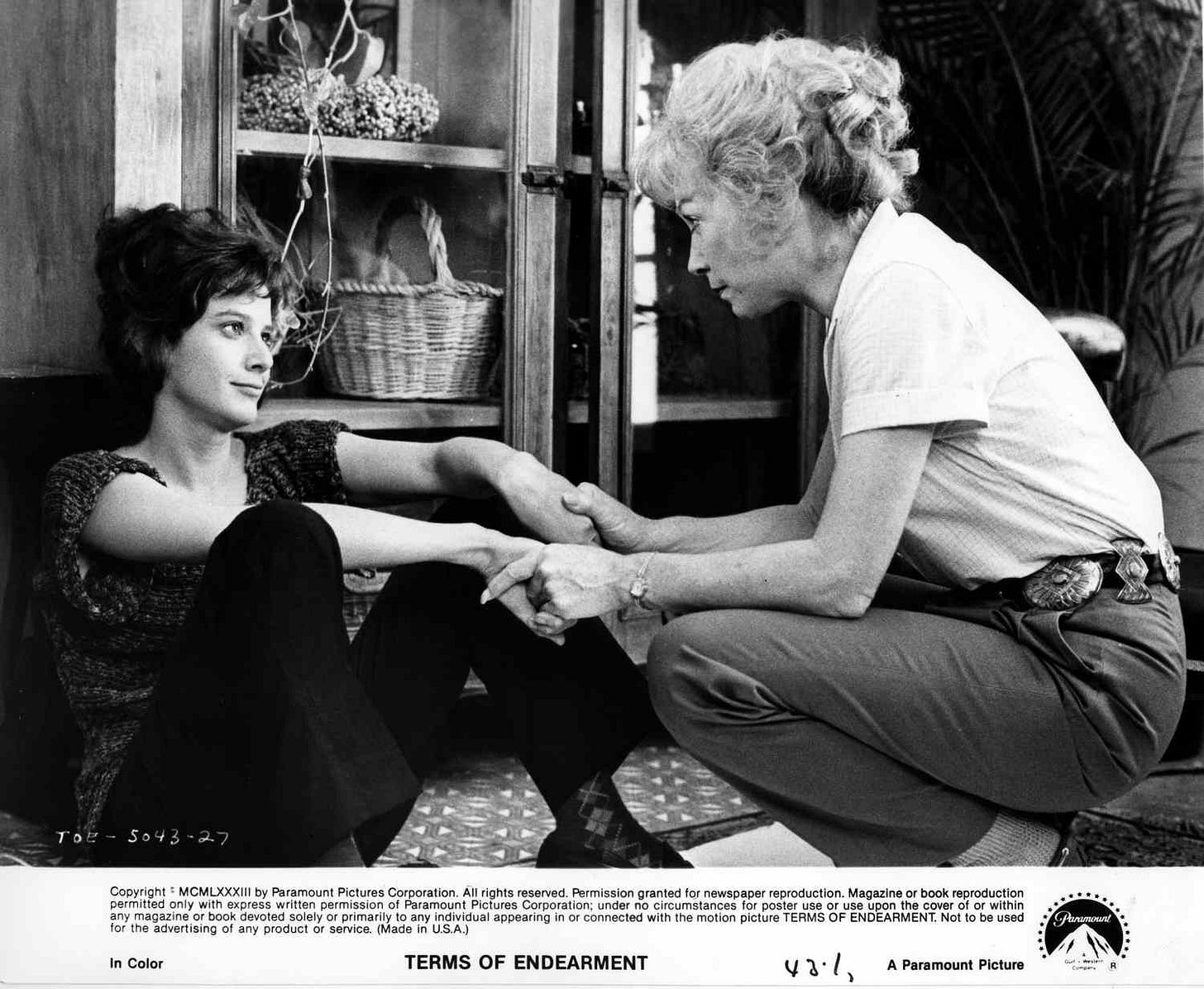Movie Review #2: Terms of Endearment (1983)
1983's Terms of Endearment is a beautifully messy, complicated snapshot of relationships, family, and everyday life.
Postpostmodernism is an exploration of life after postmodernism, investigating both “high art” and “low culture” while casting a critical gaze on Grand Narratives as well as life in the 21st-Century.
Terms of Endearment works because it avoids moralizing. By most 2024 standards, Aurora Greenway (Shirley MacLaine) seems, at first glance, a terrible mother. Her relationship with her daughter, Emma (Debra Winger) is inappropriately close, from a young age. She doesn't support her marriage to the unfortunately-named Flap (Jeff Daniels). She won't lend her money when they're struggling. When Emma is in need of medical treatment towards the end of the film, however, she's in the nurses' station screaming bloody murder. She clearly loves her daughter as well as her grandkids. Maybe she's not, in fact, a terrible person, but just struggles a bit with her emotions? (as do we all.)
Nothing is clean and easy in Terms of Endearment. Emma thinks she knows everything when she's young and acts impetuously. Flap might be excused for being un-ambitious, but his philandering is a bridge too far. He also falls short as a father (but also clearly loves his kids.) Garrett Breedlove (Jack Nicholson), Aurora's horndog astronaut neighbor, is clearly a sexist jerk who's also irresponsible and emotionally unavailable. He also turns out to be an unexpectedly nice, warm, and caring person with an intuitive knack with kids.
Terms of Endearment is largely about the relationship between Emma and Aurora. The film follows the mother and daughter over the course of 30 years, beginning with Emma's childhood and following the pair as Emma gets married, starts her own family, and leaves Houston for Des Moines, Iowa to support Flap's teaching career. The movie seems to race by in an instant, as every scene rapidly leaps forward in time. One second, Emma and Flap are just getting married. Moments later, they have two kids. And then three.
Meanwhile, Aurora continues her slightly detached life in Houston. She'd never gotten back into dating following the death of her husband, devoting her time, energy, and attention to her daughter and garden instead. She occasionally entertains a litany of potential suitors to feel like she still has it, but she grows bored and even resentful of their disingenuousness. After a disastrous birthday dinner, she finally decides to give her sleazy neighbor Garrett a chance, beginning an unlikely whirlwind romance.
As the film progresses, Emma and Flap's marriage begins to falter. First, Flap steps out, followed by Emma, who begins a long-standing affair with Sam Burns (John Lithgow), a sweet and well-intentioned banker in a complicated marriage. These tensions become a powder keg that ultimately detonate their marriage, causing Emma and the kids to return to Houston. While in Texas, Emma discovers two lumps during a routine medical procedure, sending the film hurtling towards its shattering conclusion.
How Does Terms Of Endearment Hold Up?
Terms Of Endearment is undeniably a good movie. It's also an important film, winning an incredible 5 Academy Awards, including best picture, and earning the second-highest box office for 1983, only coming in second to Return of the Jedi. The fact that such a complicated, heart-rending movie earned $165 million shows just how much the movie landscape has changed in the last 40 years.
What is most striking, to me, is how virtually none of the characters in Terms Of Endearment are "good people" by 2024 standards. For all intents and purposes, Aurora is abusive not only to her daughter but also her grandkids, as shown in one of the movie's most striking and controversial scenes. Emma loses her shit on her kids on more than one occasion, like the scene in the supermarket parking lot after suffering the humiliation of not being able to afford her groceries. Flap is a womanizer who neglects his family to further his own career. Nobody ends up looking particularly good. Nearly everybody will look at least somewhat familiar, though, especially if you've grown up without a ton of money.
Terms of Endearment comes off as a real depiction of real people. It shows the stress of money struggles and financial worry. It's honest about the toll that unequal relationships can have on a family. It owns how cycles of abuse can be perpetuated across generations and, most importantly, it doesn't make excuses for it.
It's almost impossible to imagine a movie with a young mother losing her shit and screaming in her 10-year old's face in 2024. It's inconceivable a movie would show an adult hauling off and smacking a child across the face, unless they're being depicted as a child-abusing monster like in Stephen King's IT. Some critics take issue with the assessment that's "just how things were," but, speaking as someone who was there, that's just how things were. I've seen the most polite, soft-spoken Christian women haul off and smack a kid across the face without a second thought. Ideas around abuse were different then.
Sanitizing our cinema runs the risk of cutting off discussion, especially if the topic involves nuance in any regard. We need to be able to see real, honest depictions of family life to have clear, honest, actionable conversations about things that require real change.
For me, personally, it's thrilling and refreshing to see a movie showcasing real scenes of everyday life from ordinary people. Too much of 21-st Century cinema has surrendered to the spectacle, trading in heart and empathy for gloss and spectacle. It's not a perfect movie - Michael Gore's sub-Chariots of Fire synth score feels unsuitably sweet and cloying, giving a jaunty, adventurous feel to what is, at its heart, a deadly serious character study. Its tone and focus is a bit all over the place, as well. For much of the movie, it seems like Emma's story, only to pirouette towards the end to a focus on Aurora. Add in some subtle sexist digs, although coming from on-screen characters rather than the director per se - and its fair to say that Terms of Endearment has its problems. Its story is maybe even more important to tell.
Strip away the buoyancy and forced '80s feelgood optimism, and Terms of Endearment reveals itself as a deep, penetrating character study of a family, spanning three generations. It deserves to be mentioned alongside other scoping, longitudinal, similarly messy family dramas like Ingmar Bergman's Fanny and Alexander or Robert Altman's Three Women.
Terms of Endearment can be streamed on Pluto TV, Showtime, and Paramount+.
J. Simpson is a prolific academic writer, journalist, and critic, specializing in dark, experimental, and avant-garde art. You can follow him on Letterboxd, Twitter, Instagram, Threads, BlueSky, and GoodReads.





